BARTHOLOMEW (1991-the present)
“We do not proselytize anyone,
nor do we participate in dialogues
between Christians and our brother Muslims
in order to convince them to accept our own faith.”
Biographical Note
Patriarch Bartholomew was born on February 29,1940, in the village of Aghioi Theodoroi on the Aegean island of Imvros (Turkey), to Christos and Meropi Archontonis who christened him Demetrios. His father was a barber and coffee shop owner. Following his studies at Imvros and Constantinople, he enrolled at the Theological School of Halki. After graduating from Halki Theological Academy in 1961, he was ordained a deacon and named Bartholomew on August 13, 1961, by the super-ecumenist Meliton of Chalcedon, at that time the Metropolitan of Imvros and Tenedos. Then, contrary to the Canons, Fr. Deacon Bartholomew served for two years as an officer in the Turkish Armed Forces. He then returned to theological studies, this time at the Uniate school of the Pontifical Oriental Institute at Gregorian University in Rome, where he studied from 1963-1968. He then continued his studies at the Ecumenical Institute in Bossey, Switzerland, and at the University of Munich. He was ordained to the priesthood in 1969. In 1970, Patriarch Athenagoras made Bartholomew an archimandrite and in 1972 Patriarch Demetrios made Bartholomew head of his Personal Patriarchal Office. He was soon ordained Metropolitan of Philadelpia and then of Chalcedon [an anti-canonical transfer of sees], and served for 8 years as the Vice-President of the WCC Faith and Order Commission. In 1991, Bartholomew lead the Patriarchal delegation to the infamous 7 th General Assembly of the WCC in Canberra, Australia, and, after the scandal of the WCC’s use of pagan ceremonies and theology, was the chief proponent of continued participation in WCC assemblies. Bartholomew, now 62, speaks seven languages. He frequently quotes favorably from the Koran, the Torah, and various Muslim mystics [another canonical violation]. He was enthroned on Nov. 2, 1991, and, as his official biography states, “he has tirelessly pursued the vision of his enthronement message...interfaith tolerance and coexistence, protection of the environment and a world united in peace, justice, solidarity and love.”
Preface
Bartholomew’s patriarchate has taken up where Athenagoras and Demetrios’ left off. Under Athenagoras, the Ecumenist agenda was restricted, as he said, by the not yet flexible enough mindset of some of his flock. Thus the slow process of the ‘dialogue of love’ and double talk was needed to comfortably ease them into believing in the unity of all religions. Nevertheless, he pushed ahead as far as he could, lifting the anathemas on Papism, concelebrating with Papists, Protestants, and Monophysites, and beginning the practice of giving communion to the aforementioned heretics. Under Demetrios, the policy of concelebrating with and communing Papist heretics became the officially sanctioned policy of the EP, the anathemas of the last four Ecumenical Councils upon Monophysitism were declared erroneous and void, proselytism of any so-called Christian group was said to be unreasonable, and Orthodox, heretics, Jews, and Muslims were declared to worship the same God and receive grace and salvation through the Holy Spirit’s presence in their religions. Now, taking up where his masonic predecessors left off, Bartholomew will more explicitly affirm these things and work for the practical realization of the unity of all men and all religions, condemning all efforts at proselytism as sin and working with pan-religious organizations for the employment of religion as a pliable propaganda tool and control mechanism of global government in the hands of the United Nations Organization.
*******************************************************
As we will show you, Bartholomew, although he views the Orthodox Church as historically “the Church”, he neither restricts “the Church” to Orthodoxy alone, nor does he see the grace of the Holy Spirit as limited to Her or even to some nebulous concept of Christianity, but even includes Jews, Muslims, Zoroastrians, Sikhs, Hindus, etc. as among those ‘united in the spirit [sic] of the one God ’.(1)
As an adept Royal Arch mason, he knows how to ‘be all things to all men’ in a sense which the Apostle Paul definitely rejected. Hence when speaking to Roman Catholics he will declare with the Pope “the fundamental ecclesiological truth” that Orthodoxy and Papism “constitute the two lungs of the Body of Christ” (2) and, therefore,
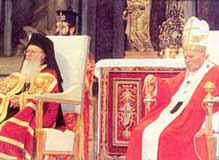
On June 29, 1995, in the Basilica of St. Peter in Rome,
Bartholomew and Pope John Paul II
concelebrate a televised Papal High Mass.
“Our Churches are recognized mutually as Sister Churches, responsible together for the preservation of the One Church of God...We exhort our faithful, Catholic and Orthodox, to strengthen the spirit of brotherhood, which derives from a single Baptism and participation in the sacramental life.” (3)
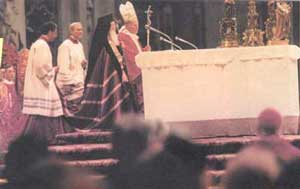
As if this were not enough, Bartholomew, implying the damnation of the Orthodox who anathematized the Papist heresies, has further blasphemously declared:
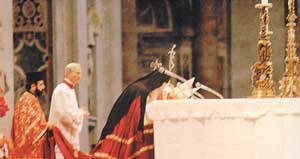
“Those of our forefathers from whom we inherited this separation were the unfortunate victims of the serpent who is the origin of all evils; they are already in the hands of God, the righteous judge...And these men, being the causes for the schism, are now in the hands of God, the righteous judge.”(4)
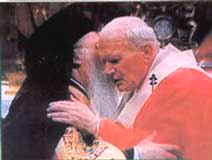
And as for manifesting visibly the invisible unity of this ‘divided’ “One Church of God”, how will this happen? According to Bartholomew, the union will come [Has it not already happened?] without any recantation of heresies, without any repentance, and certainly without any conversion to one Faith or another, but just through a union based on the ‘fundamentals’ that the two religions supposedly already share:
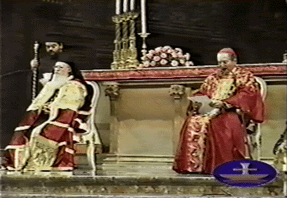
Above: In May of 1997, Bartholomew and his usual train of
metropolitans
travel to the Roman Catholic Cathedral of St. Ambrose in Milan, Italy
to concelebrate Mass on Western Pentecost with Papist Cardinal Martini.
Below: Bartholomew and Cardinal Martini hand off their episcopal staffs to their deacons
(one of whom partially obstructs our view)
and exchange their fraternal kiss at the consecration.
“The dialogue between the Orthodox and the Roman Catholic Churches clearly has as its further aim the union of these two ecclesiastical traditions. This desire has been expressed many times in our mutual exchanges with His Holiness, the Pope of Rome. We reiterated it in our meeting with the Pontiff in Rome in 1995. The point at issue is not whether one or the other will compromise their position, but rather that we should come together on common fundamentals and try to expunge those factors which led to the separation in the first place. ”(5)
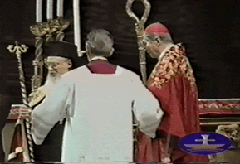
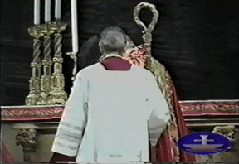
But has not such unity been quite physically manifested many times? For instance, at his concelebration with the Pope on June 29, 1995, in the Basilica of St. Peter in Rome, or the one with Cardinal Martini of Milan in May of 1997? [Photos of which have been displayed above]. In each instance, Bartholomew did everything that a concelebrating bishop would do, except partake of the wafer and cup (in 1995, a last minute decision to appease ‘conservatives’ in Greece.) (6)
So is Bartholomew merely pro-Papacy? His views are not so ‘narrow’ as that. While in the above he seems to put the limits of the Church at Papism and Orthodoxy, Bartholomew simultaneously bears quite a different, and shall we say more ‘Evangelical Protestant’, message to the Protestants interviewing him for their magazine Christian History . In answer to the question:
“The Orthodox claim to constitute the only true Church. This claim, naturally, makes Catholics and Protestants balk. How should we understand this claim? What, according to the Orthodox, is our status before God? ”
Bartholomew, quickly responding that the interviewer has quite misunderstood the Orthodox belief, states,
“[T]he Orthodox Church has never deviated from that consciousness and fundamental perspective of agape--love and unity. We are called to exercise the “ministry of reconciliation” (II Corinthians 5:18), and we look forward to a return of the holy Churches of Christ to unity in him....
“We do not hold that exclusivity means judgment or exclusion [huh??? - editor] . The idea that membership in a visible Church organization is requisite for membership in heaven is based on a false paradigm--that we somehow parallel the kingdom of God in this world. The kingdom is not an exterior reality, rather it is interior, at least until the end of time. ” (7)
And to back up such Universalist nonsense, Bartholomew recently approved the Korean Orthodox Church’s desire to celebrate Pascha with the Papists and Protestants:
“Members of Protestant, Catholic, and Orthodox churches in South Korea will meet for a combined prayer service for Christian unity on Easter Sunday, April 15.
The committee for church unity of the National Council of Churches in Korea (NCCK), along with the Korean Catholic Bishops’ Committee for Promoting Christian Unity and Interreligious Dialogue, the Korean Orthodox Church, and Korean Lutheran Church, have agreed to hold a Common Easter Prayer for Christian Unity on Easter Sunday at the Korean Orthodox Cathedral in Seoul... The Easter prayer meeting is expected to last about 90 minutes, and has the support of the Ecumenical Patriarch of Constantinople, Bartholomeos I. ” (8)
Moreover, even before this, on August 22, 1993 in Uppsala, Sweden, Bartholomew accompanied by two EP Metropolitans, Cardinal Cassidy, and the Lutheran Archbishop of Uppsala celebrated the 400th Anniversary of Sweden’s conversion to the Lutheran heresy in a televised Lutheran Mass! Bartholomew gave both the Cardinal and the Lutheran Archbishop fraternal kisses at the ‘consecration’, called all “brothers and sisters in Christ ”, and preached a sermon on how the Church was unhappily divided and must be reformed from its Orthodox, Papist, and Protestant parts. He presented the Lutheran Archbishop with a silver chalice from which he “hoped to commune together with [the Lutherans] as soon as possible ”.
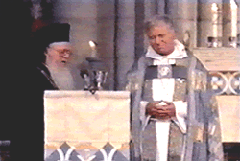
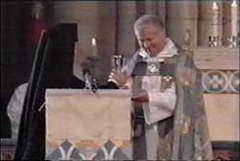
The Lutheran Archbishop said that he too hoped fervently for their communion in “the bread and wine of Jesus Christ ” and used the chalice immediately for his ‘consecration’ of the wafer and cup. At the end of this debacle, Bartholomew gave the final liturgical blessing in Greek, and then all the bishops gathered in front of the altar and gave their blessing simultaneously to the Lutheran parishoners.
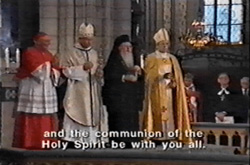
Plainly, such actions convey the message that not only is conversion from heresy to Orthodoxy not necessary for salvation, but that there is, in fact, no real difference between heresy and Orthodoxy. Indeed, this was already clearly declared within a year of Bartholomew’s elevation to the Patriarchal throne in the 1992 absolute condemnation of proselytism among any so-called ‘Christian’ group by all the Patriarchates:
"In reference to this subject, we remind all that every form of proselytism....is absolutely condemned by the Orthodox. Proselytism, practiced in nations already Christian, and in many cases even Orthodox, sometimes through material enticement and sometimes by various forms of violence, poisons the relations among Christians and destroys the road towards their unity." (9)
In addressing the Armenian Monophysites, the borders of the Church expand yet further beyond Protestantism and Papism:
“Your Beatitude, Patriarch Mesrob II of the Armenians in Turkey, much beloved and
dear brother in Christ God: Grace and peace from God the Father and our Lord Jesus Christ be with
You.
We should like to express to Your beloved Beatitude and through You to all the Armenians who are
faithful to Christ our spiritual participation in the joy of the Christ-loving Armenian people
upon the 1700th anniversary, rightfully and festally celebrated, of the mass reception by the
Armenian Nation of the faith in Jesus Christ the Son and Logos of God...
March 26, 2001
Your Beatitude’s Beloved brother in Christ
Bartholomew of Constantinople” (10)
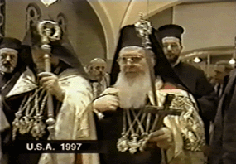
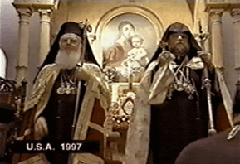
Above: Concelebration between the Armenian Monophysite
Catholicos
Patriarch Aram I and Bartholomew in the Armenian Church
of St. Stephen, Boston, USA, on Oct. 28, 1997.
In his speech, following the concelebration, Bartholomew stated: “So often we have seen
that we hold the greater part of the theological tradition of our two Churches in common. That
which unites us is greater than that which divides us. Indeed, those things which divide us can
be said to be external, historical, and human factors which have hindered the rapprochement*
of our Churches.”
(From the videotaped speech, see video: “The Heresy of Ecumenism and the Patristic Stand of
Resistance”, C.T.O.S., Etna, CA, 1998.) [*Note: (French) rapprochement - coming
back together]
Is Bartholomew sincere in calling this successor of the heretic Evtyches, a denier of the incarnation of Christ, “much beloved and dear brother in Christ God ”?! Does he really believe that this Monophysite Patriarch and “all the Armenians...are faithful to Christ ”? How can those who deny the incarnation of Christ and make it an illusion, saying that he had no real body, but simply manifested some kind of anthropomorphic form of His Divinity, how can these be a part of the Body of Christ which they deny? Rather, as the Apostle John says, “Every spirit which confesseth not that Jesus Christ hath come in the flesh is not of God. And this is that spirit of the antichrist, which ye have heard that it is coming, and now already it is in the world” [1 Jn. 4:3].
But we have forgotten that it was Bartholomew who confirmed the Joint Statements of the Monophysite-‘Orthodox’ dialogues, who reached such heretical conclusions as:
“[W]e now clearly realize and understand that our two families [Orthodox and Monophysites- editor] have always loyally guarded the same and authentic Christological Orthodox faith, and have maintained uninterrupted the apostolic tradition although they may have used the Christological terms in a different manner. It is that common faith and that continual loyalty to the apostolic tradition which must be the basis of our unity and communion... The two families accept that all the anathemas and the condemnations of the past which kept us divided must be lifted by the Churches so that the last obstacle to full unity and communion of our two families can be removed by the grace and the power of God. The two families accept that the lifting of the anathemas and the condemnations will be based on the fact that the Councils and the fathers previously anathematized or condemned were not heretics....” (11)
Bartholomew is not a man who does not back up his words with actions. Consequently, he has quite concretely manifested the unity of the Ecumenical Patriarchate with the heretical Monophysites through various concelebrations with the heads of that blasphemous group as well. For instance, there was his concelebration with Aram I, Armenian Monophysite Catholicos Patriarch, in 1997(pictured above), or the one with Pope Shenouda of the Coptic Monophysites in 2001 as we read in the Arabic magazine of the Coptic Monophysite Patriarchate, Al-Keraza :
“On Thursday 13 September, Pope Shenouda flew to Istanbul airport accompanied by HE Metropolitan Bishoy and Bishop Angelos. They met with the Ecumenical Patriarch His All Holiness Bartholomew and con-celebrated the feast of the Cross of their church in the morning of Friday 14 September.” (12)
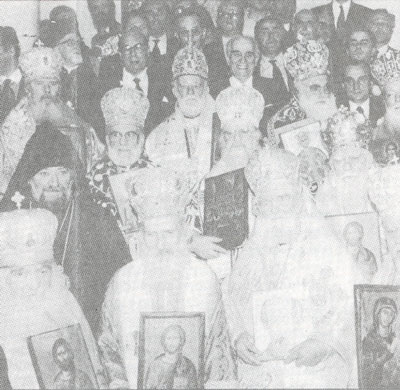
The Sunday of Orthodoxy as an Ecumenical event? Traditionally on the Sunday of Orthodoxy, after the procession with the icons, ‘Eternal memory’ is chanted for all those who have defended and preserved the Faith and ‘Anathema’ is pronounced upon each and all heretics both ancient and modern; however all the Ecumenist Patriarchs, who gathered in Constantinople [including Bartholomew (center) and Alexei II (upper left)], celebrated it with the heretics (e.g. the Armenian Monophysite Catholicos Patriarch Aram I, standing to the left of Bartholomew) and without the anathemas!
And, again truly ‘being all things to all men’, when addressing Jews and Muslims, he speaks of the “common Father” , the complimentary nature of the “Abramic faith traditions” , and frequently talks, as if a Unitarian, of the need for “cooperation among the three monotheistic religions and also among all peoples... to reveal to all peoples the peaceful and peace-loving person of God... the one and only true God, who has gathered us here in love. ” (13)
And of course, conversion is out of the question:
“Of course, this is not the first time that the Ecumenical Patriarchate is conducting a dialogue with our beloved Muslim brothers...As the first among equal hierarchs of the Orthodox Church, we believe, as it is also found in the Koran, that “religion is not imposed” (Chap. II, no. 257)... We respect an individual’s choice with regard to his or her faith, and we do not proselytize anyone, nor do we participate in dialogues between Christians and our brother Muslims in order to convince them to accept our own faith.” (14)
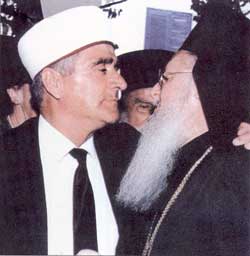
Bartholomew embraces with a fraternal kiss
his “beloved brother Muslim”,
a Turkish imam (a Muslim religious leader).
Conversion among monotheists is unnecessary in as much as:
“God is a God of peace and is well-pleased with the peaceful co-existence of men and, of course, of those who worship Him independent of the differences, which exist in regards to faith between the three great monotheistic religions.” (15)
And let us not forget that all paths lead to God and are equally inspired:
“If the diverse peoples of a culture look to the memories of their faith traditions, whatever they may be, they will be sustained, they will be fed the food of God’s spiritual knowledge...Orthodox Christian and modernist, Protestant and modernist, Jew and modernist, Catholic and modernist: however we worship, as long as we abide in our faith and unite it to our works in the world, we bring the living and always timely message of Divine Wisdom into the modern world.” (16)
And when he is addressing a wider group, such as which includes Zoroasterians, Hindus, etc., he will tell them simply that “we are united in the spirit [sic] of the one God, ‘Creator of all things, visible and invisible’” (17) and, therefore, “we are convinced that there is more that unites the community of man, than divides us”. (18)
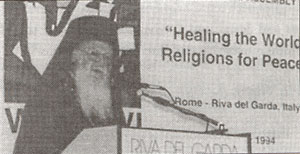
“Somehow the world is growing weary of bloodshed; it is tiring of fanaticism... We must build on this. There is a great hunger for spirituality, for transcendent meaning. We must satisfy it. There has never been a greater need for spiritual leaders to leave our cloisters, come together, and take action... [W]e must teach our people the blessings of peace... [O]f all the precepts of our diverse religions, the first principle must be the divinity of each and every one of God’s children.”
“Brothers and sisters, the watchword of the Holy Orthodox Church today is unity. We are learning unity within our own house; we must pursue unity with all the children of God... Roman Catholics and Orthodox, Protestants and Jews, Muslims and Hindus, Buddhists and Confucians: the time has come not only for rapprochement, but also for an alliance and joint effort... We have within our grasp the vision of the Psalmist: “Behold, how good and how pleasing it is for brethren to dwell together in unity!” We pledge to you today that the Orthodox Christian Church will do everything in her power to fulfill that vision. ” (19)
For this more general audience, this pseudo-Patriarch frequently and stridently inveighs against the absolute ‘evil’ of proselytism and conversion:
“The Orthodox Church does not seek to convince others of any one particular understanding of truth or revelation, nor does it seek to convert others to a particular mode of thinking...Whenever human beings react to the perspectives and beliefs of others on the basis of fear and self-righteousness, they violate the God-given right and freedom of others to come to know God and one another in the manner inherent to their identity as peoples...Such xenophobic tendencies are chiefly the result of being out of communion with God...When human beings are in communion with God, who Himself is the very essence of inexhaustible love, xenophobia-- fear of the other--is not possible since human beings do not see each other as strangers, but rather as brothers and sisters in communion with the loving Lord.” (20)
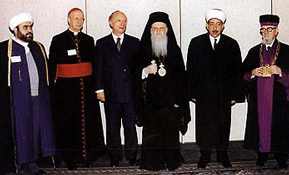
“These principles of brotherhood and tolerance were reiterated on the sacred Island of Patmos last month in September when we convened a gathering of the Primates of the Orthodox Christian Churches... Together, with one heart, mind and voice we condemned ‘... the alteration or extinction of other peoples’ cultural and religious particularities [i.e. proselytism and conversion -- editor] ; and to the repression of the sacred rights of freedom and dignity of the human person and minorities everywhere.’” (21)
Zealous for pan-religious unity, he organized the blasphemous pan-religious debacle of the U.N. Millenium Peace Summit, which we will speak of later, and continually approves and contributes to other such globalist and pan-religious groups, e.g. the Council for the Parliament of the World’s Religions.
For example, on November 3, 1997, while touring the USA, Bartholomew ‘blessed’ the continued participation of the Greek ‘Orthodox’ Archdiocese of America in the Parliament of the World’s Religions, a supremely syncretistic organization which calls for the unity of all religions in the service of ‘green’ socialism and a global government. He commented on the work of the Parliament as follows:
“‘We are cognizant of the unique commitment that the religious community of Chicago has made to promote the cause of understanding between her faith communities. There is a long and noble history in this city of religious cooperation and exchange.’ ‘We give thanks to Almighty God that the people of the faith communities of this city have persevered in their work toward understanding. We bestow on them our Patriarchal blessing and commit ourselves today to continue our support of the Diocese of Chicago in this noble work.’ ‘In the midst of our diversity, we seek to know and fully commune with the presence of the Divine. We can share this desire for God, seeing in our differences the mystery of God’s all-embracing love for His creation. Let us continue to model love, in our acceptance without judgement of one another as children of God.’ ” (22)
As if the name itself were not indicative enough of the Parliament’s universalist character, two quotations from its founding members will quite sufficiently elucidate its character and purpose:
“Religion, like the white light of heaven, has been broken into many-colored fragments by the prisms of men. One of the objects of the Parliament of Religions has been to change the many-colored radiance back into the white light of heavenly truth.” (23)
“Do not care for dogmas, or sects, or churches, or temples. They count for little compared with the essence of existence in each man which is spirituality.” (24)
[We will be detailing the ungodly “U.N. Millenium Peace Summit for Religious and Spiritual Leaders” in a seperate article. A few quotations from the keynote speakers will give the gist of the summit:
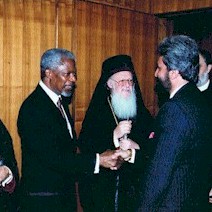
Bartholomew, one of the four main organizers of the summit,
with Bawa Jain and Kofi Annan, Secretary General of the UN,
at a preparatory meeting in Jain’s New York Interfaith Center.
Ted Turner, Summit Organizer, Keynote Address: “It is not necessary to believe that Christ alone is the savior. Every religion should welcome goodness from every other religion with an open heart.”
Bawa Jain, Indian Con-man and Summit Organizer: “The goal of the International Advisory Council of Religious and Spiritual Leaders is to enhance an d strengthen the work of the United Nations... [through] an International Advisory Council of Religious and Spiritual Leaders that is designed to serve as an ongoing interfaith ally to the U.N. in its quest for peace, global understanding and international cooperation... What we need to engage in is an education factor of the different religious traditions and the different theologies and philosophies and practices. That would give us a better understanding, and then I think [we have to deal with] the claims of absolute truth -- we will recognize there is not just one claim of absolute truth, but there is truth in every tradition. That is happening more and more when you have gatherings such as these.”
S. N. Goenka, Buddhist leader: “When there is darkness, light is needed. Today, with so much agony caused by violent conflict, war and bloodshed, the world badly needs peace and harmony. This is a great challenge for religious and spiritual leaders. Let us accept this challenge.
Every religion has an outer form or shell, and an inner essence or core. The outer shell consists of rites, rituals, ceremonies, beliefs, myths and doctrines. These vary from one religion to another. But there is an inner core common to all religions: the universal teachings of morality and charity, of a disciplined and pure mind full of love, compassion, good will and tolerance. It is this common denominator that religious leaders ought to emphasize, and that religious adherents ought to practice. If proper importance is given to the essence of all religions and greater tolerance is shown for their superficial aspects, conflict can be minimized... Whether it is the Bible, the Koran or the Gita, the scriptures call for peace and amity. From Mahavir to Jesus, all great founders of religions have been ideals of tolerance and peace...There are bound to be differences between religions. However, by gathering at this World Peace Summit, leaders of all the major faiths have shown that they want to work for peace. Let peace then be the first principle of “universal religion”... Under the aegis of the United Nations, let us try to formulate a definition of religion and spirituality... There would be no greater misfortune for humanity than a failure to define religion as synonymous with peace. This Summit could propose a concept of “universal religion” or “non-sectarian spirituality”, for endorsement by the UN. I am sure that this Summit will help focus the world’s attention on the true purpose of religion.”
‘His Divine Holiness’ Pramukh Swami Maharaj, Hindu leader, Inaugarul Address: ‘A Call to Dialogue - Our Collective Responsibility’:
“Just as the unity of our followers makes our religion strong and protected, the unity of all faiths will make our common future strong and protected... True progress of any religion lies not in growth by numbers but by the quality of life and purity and the spiritual awakening in the adherents. Thus every Hindu should become a better Hindu, every Jew a better Jew, every Christian a better Christian and every Muslim a better Muslim and every follower should become a better follower... Religious leaders should not dream of establishing their religion as the one religion of the world, but dream of a world where all religions are united. Unity in diversity is the first lesson of life. Flourishing together by working together is the secret behind peace. From Rigvedic times, the Hindus have professed this global broadmindedness of a Beautiful Borderless World.”
Met. Kyril of Smolensk, Moscow Patriarchate: “Taking into account the importance and timing of such a gathering as the World Peace Summit, we support the declaration towards global economic and social justice. It was our dream for the new millennium to have a world order.”

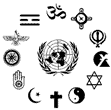
Logos connected with the Summit:
Left: The New York Interfaith Center Logo
Right: The UN Millennium Peace Summit Logo.
The former connects all religions’ emblems in the shape of a ‘Star of David’. The latter shows the U.N.’s logo (a globe with the Roman imperial wreath around it) having all the symbols associated with the worlds chief religions gathered around it.
*******************************************************
ENDNOTES
(1) ADDRESS BY THE ECUMENICAL PATRIARCH BARTHOLOMEW SIXTH WORLD ASSEMBLY OF RELIGION AND PEACE RIVA DEL GARDA, ITALY - NOVEMBER 4, 1994, 3:00 PM; www.patriarchate.org/SPEECHES/1994/NOV_4-World_Assembly.html ; see also endnote #17.
(2) Address of Patriarch Bartholomew during the his concelebration of the Patronal Feast of the Phanar with Cardinal Cassidy, November 30, 1992, (the Phanar - Constantinople); see The Orthodox Church (OCA), February 1993, p. 6; and see Ekklesia , no. 1(January 1-15, 1993) p. 14.
(3) “Joint Communique”, signed on June 29, 1995; see the official publication of the Ecumenical Patriarchate, Episkepsis , No. 520, July 31, 1995, p. 19.
(4) Address of Ecumenical Patriarch Bartholomew to the Papal Delegation at the Patronal Feast of the Phanar, Nov. 30, 1998; cited in: Community of Mt. Athos - Karyae, “Open letter from the Athonite Monks to Ecumenical Patriarch Bartholomew”, 11th/24th May 1999. [Editor’s Note: According to the Holy Fathers (e.g. Ss. Cyprian of Carthage and John Chrysostom), if someone causes a schism or tearing apart of the Body of Christ, then even if he should give up his life in martyrdom for Christ, he has no hope of salvation. Consequently, Bartholomew implies our Orthodox forefathers’ damnation.]
(5) “There are Great Expectations: Patriarch Bartholomew on Reconciliation with Rome”, James Wilde, Time (International Edition), May 5, 1997, Vol. 149 No. 18; “Religion” section.
(6) This ‘omission’ was filled recently when, at the Vatican’s 2002 Inter-religious worship ceremonies at Assisi, Bartholomew and other ‘Christian’ heretics all joined the Pope in the Lower Basilica for Mass and partook of that unchanged wafer and cup.
(7) “‘We Do Not Wish to Blur the Faith’: The spiritual head of Orthodoxy speaks some frank words to Protestants: An interview with Bartholomew I”, Christian History , Spring 1997, Issue 54, Vol. 3, No. 2, Page 42.
(8) “Koreans Plan Historic Easter Prayer for Christian Unity: Taking advantage of calendar anomaly, Protestants, Catholics, and Orthodox will celebrate together”, Min Sungsik (Managing Editor of The Christian Newspaper in Seoul), Christianity Today , “Ecumenism” section, Issue for the week of March 12, 2000; http://www.christianitytoday.com/ct/2001/111/16.0.html ; 3/12/01; Copyright © 2001 Ecumenical News International.
(9) http://www.patriarchate.org/documents/1992-primates
(10) “Ecumenical Patriarch Bartholomew Participates in Celebrations Marking 1700th Anniversary of Official Recognition of Armenian Apostolic Church”, Ecumenical Patriarchate News , posted on http://www.patriarchate.org:85/patriarchate/.
(11) “Joint Declaration of the 3 rd Meeting of the Joint Commission for Theological Dialogue between the Orthodox Church and the Oriental Orthodox Churches”; see Episkesis , No. 446 (Oct. 1, 1990). The third meeting of the Joint Commission for Theological Dialogue between the Orthodox Church and the oriental Orthodox or Monophysite Churches took place at the Ecumenical Patriarchate Center, Chambesy (Geneva) Switzerland from the 23rd to the 28th of September 1990. The Commission met under the chairmanship of Metropolitan Damaskinos of Switzerland. All Patriarchates were represented. On the basis of the First Joint Declaration accepted at the Anba Bishoy Monastery in 1989 and the Second Joint Declaration at Chambesy in 1990, yet another document was produced in 1993 in the same Center of the Patriarchate of Constantinople at Chambesy. It gave precise instructions on the lifting of anathemas, the coordinating of the diptychs, and the establishment of communion between Monophysites and ‘Orthodox’.
(12) “Meeting between Pope Shenouda III and the Ecumenical Patriarch Bartholomew I”, Al-Keraza , No. 31-32; Friday Sept. 28, 2001; translated and published by the Coptic Patriarchate’s Computer Dept. news service (“Church News”); http://www.coptic.net/public/news/2001-09-28.txt.
(13) Patriarch Bartholomew “INAUGURAL ADDRESS OF THE ECUMENICAL PATRIARCH B A R T H O L O M E W ON THE MAIN THEME: “The Peace of God in the World” (Towards Peaceful Co-Existence and Collaboration Among Monotheistic Religions)”; (19 December 2001).
(14) “Address of Ecumenical Patriarch B A R T H O L O M E W: On the Subject: ‘Relations Between Christians and Muslims’”; Delivered In The Emirate of Bahrain on September 25, 2000; http://www.goarch.org/usvisit2002/holiness/speeches/bahrain.asp.
(15) See “Message of Bartholomew to Muslims” (for Ramadan); Nikos Papadimitriou, Flash.gr news , Greece, dated Dec. 16, 2001; published in the Feb. 22, 2002 edition of Flash.gr news Ste^n Ellada (Ellada [Greece] section] http://greece.flash.gr//soon/2001/12/16/14339id/.
(16) ADDRESS OF THE ECUMENICAL PATRIARCH BARTHOLOMEW AT EMORY UNIVERSITY IN ATLANTA GEORGIA AT THE PRESIDENTIAL MEDAL AWARD CEREMONY, October 31, 1997.
(17) See endnote #1.
(18) “ADDRESS OF THE ECUMENICAL PATRIARCH BARTHOLOMEW THE C.E.O. INTERNATIONAL UNIVERSITY: ‘Fundamentalism and Faith in the New Millennium: A View From the Crossroads between East and West’”; October 25, 1995; http://www.patriarchate.org/SPEECHES/1995/OCT_25-Fundamentalism-faith.html.
(19) See endnote #1.
(20) “Statement of The Ecumenical Patriarch Bartholomew For the Forthcoming United Nations Durban World Conference Against Racism, Racial Discrimination, Xenophobia, and Related Intolerance”; given at the Phanar, March 17, 2001.
(21) See endnote #15.
(22) “Address of Ecumenical Patriarch Bartholomew to the Religious Leaders at the Greek Orthodox Diocese of Chicago, Illinois, 3 November 1997”; posted at www.goarch.org/worldnews .
(23) John Henry Brown (Presbyterian Protestant), Inaugural Speech, 1st Parliament of the World’s Religions, Chicago, 1893; Cranston, Sylvia, HPB: The Extraordinary Life & Influence of Helena Blatavsky , G. P. Putnam & Sons, New York, 1963, Vol. 12, p. 959; cited in Orthodox Life, No. 3, May-June 1994, p. 8.
(24) Swami Vivekananda (Hindu), Keynote Speaker, 1st Parliament of the World’s Religions, Chicago, 1893; Steinfels, Peter, “Religious Leaders Hold a Second World Parliament”, New York Times, Aug. 30, 1993, p. 425; cited in Orthodox Life, No. 3, May-June 1994, p. 8.
|
Archbishop Gregory Dormition Skete P.O. Box 3177 Buena Vista, CO 81211-3177 USA |
Contact: Archbishop Gregory
In a New Window. |
|
|
Copyright 2005 All rights reserved. |
